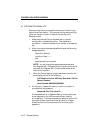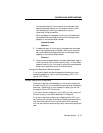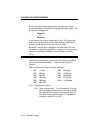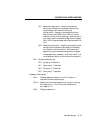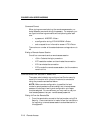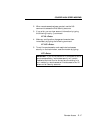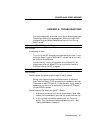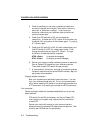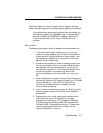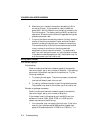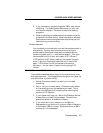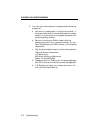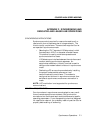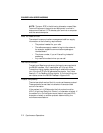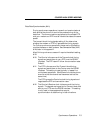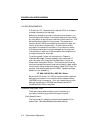
COURIER HIGH SPEED MODEMS
Troubleshooting E-3
When the modem is in Answer mode, it acts as though a Carriage
Return has been entered, but nothing has been typed at the keyboard
Your software may be misreading signals from the modem as it
automatically sends a Carriage Return and a Line Feed before
and after the RING and CONNECT messages. Sending the
Quiet mode command, ATQ1 <Enter>, should solve the
problem.
Both modems . . .
Exchange carrier signals, but fail to establish a communications link
1. If you have a fax modem, make sure it is in the correct
mode, fax or data, depending on whether the connection is
to be made with a facsimile device or a data modem. See
Fax Operations in Chapter 5 for information on switching
between Fax and Data modes.
2. Asynchronous operations: Check to make sure the proper
bit rate, word length, parity and number of Stop bits have
been selected. Synchronous operations: review the link
instructions in Appendix F. If you've set the modem to the
correct configuration, the problem may be with the
synchronous adapter or with the system you're trying to
call.
3. Check to see that your modem is at the correct Bn setting to
connect with either an HST modem (B1 setting) or V.32 terbo
modem (B0 setting). Type ATI4 for a display of the
Courier's current settings and, if necessary, send the
modem the correct setting.
4. If your modem is attempting to answer a V.32 call, you may
need to lengthen the extra V.32 answer tones. See S28 in
Appendix B.
5. Depending on your model, make sure the modem at the
other end of the line is HST compatible, V.32 terbo
compatible at 14.4K bps, or V.32 compatible at 9600 bps,
V.22 bis-compatible at 2400 bps, Bell 212A-compatible at
1200 bps, or Bell 103-compatible at 300 bps. These are the
common signaling standards for full duplex dial-up
network transmission in the U.S.



